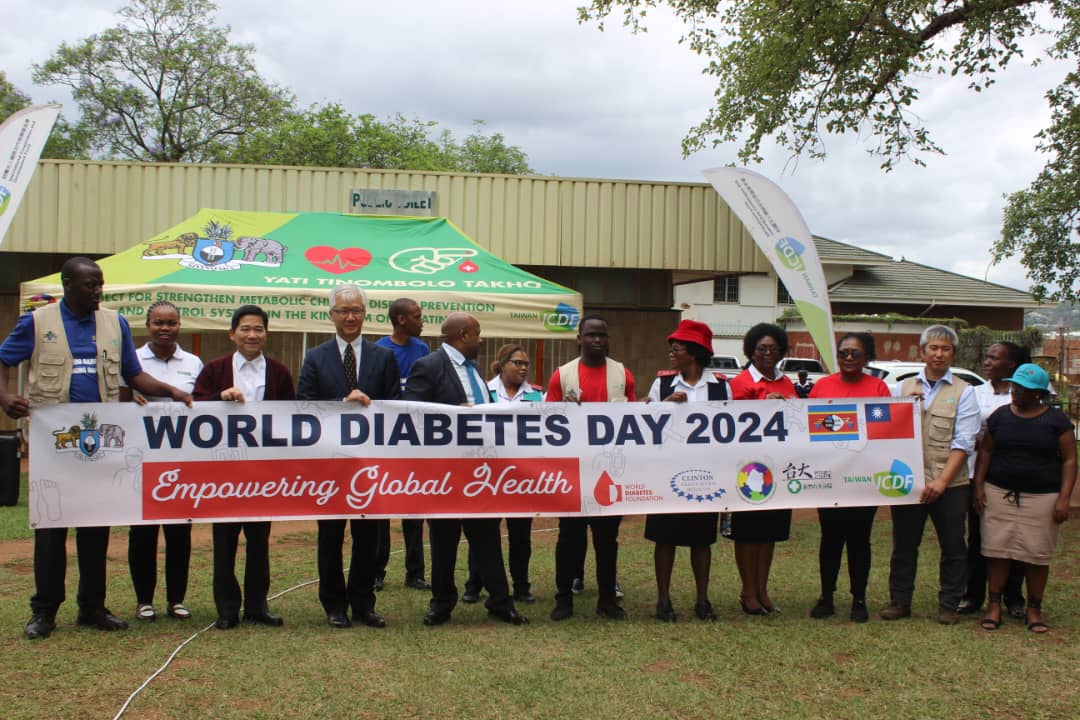by Ncaba Ntshakala
The prevalence of diabetes in Eswatini is projected to double by 2030, which is a warning that has spurred the country into action.
This was emphasized by Minister of Health Mduduzi Matsebula during a World Diabetes Day campaign held at Somhlolo Park, Manzini, in a collaborative event organized by the Ministry of Health, Taiwan Technical Mission, and Clinton Health Access Initiative, with support from partners including the Taiwan Embassy, Tex-Ray Industrial Co., Ltd., and Lions Club Focus.
During the event, the Minister highlighted the critical findings of the Non-Communicable Disease risk factor surveillance survey (STEPS) conducted in 2014.
RELATED: The Clinic Group Health Corner Wellness
The survey revealed that more than 90% of Eswatini’s adult population were exposed to one or more risk factors for diabetes, including smoking, harmful use of alcohol, physical inactivity, obesity, and poor diet.
Even more concerning was the finding that 14% of the population were living with diabetes, with projections indicating a doubling of this prevalence by 2030 if aggressive preventive measures are not urgently implemented.
“Diabetes has touched many of us in profound ways, underscoring the need for comprehensive care, heightened awareness, and timely interventions,” Matsebula stated.
The Minister raised an alarm over the fact that more than 50% of people living with diabetes in the country are unaware of their condition, leading to late diagnoses and severe complications such as amputations and kidney disease.
He emphasized that early detection is crucial to curbing the progression of diabetes and avoiding its debilitating consequences.

The commemoration of World Diabetes Day, which has been celebrated annually on November 14th since 1991, carries the 2024 theme, ‘Breaking Barriers, Bridging Gaps’.
This theme, according to Matsebula, encapsulates Eswatini’s commitment to reducing diabetes risk and ensuring equitable access to quality treatment and care for those diagnosed with the condition.
Diabetes, he noted, is a growing global epidemic that poses serious health risks, affecting vital organs like the heart, kidneys, and nerves.
Worldwide, the World Health Organization (WHO) reports that 422 million people are living with diabetes, primarily in low- and middle-income countries, with an alarming 1.5 million deaths attributed to the disease annually.
Eswatini, along with other WHO Member States, has endorsed a set of ambitious global targets to be achieved by 2030 to combat the rising tide of diabetes.
RELATED: E17 million Ndunazithini clinic handed over to Ministry of Health
These include diagnosing 80% of people with diabetes, ensuring 80% of those diagnosed have good control of glycaemia and blood pressure, and providing statins to 60% of people aged 40 and above.
Additionally, the goal is to secure 100% access to affordable insulin and self-monitoring equipment for those with type 1 diabetes.
Matsebula made emphasis of Eswatini’s dedication to meeting these targets, seeing them as a collective commitment to reducing the burden of diabetes not just within the kingdom but globally.
“By achieving these goals, we can significantly improve the quality of life for millions,” he said.
The Health Ministry, with support from its partners, was said to be doubling down on initiatives to spread awareness, promote healthy lifestyles, and enhance access to diabetes care throughout the country.


